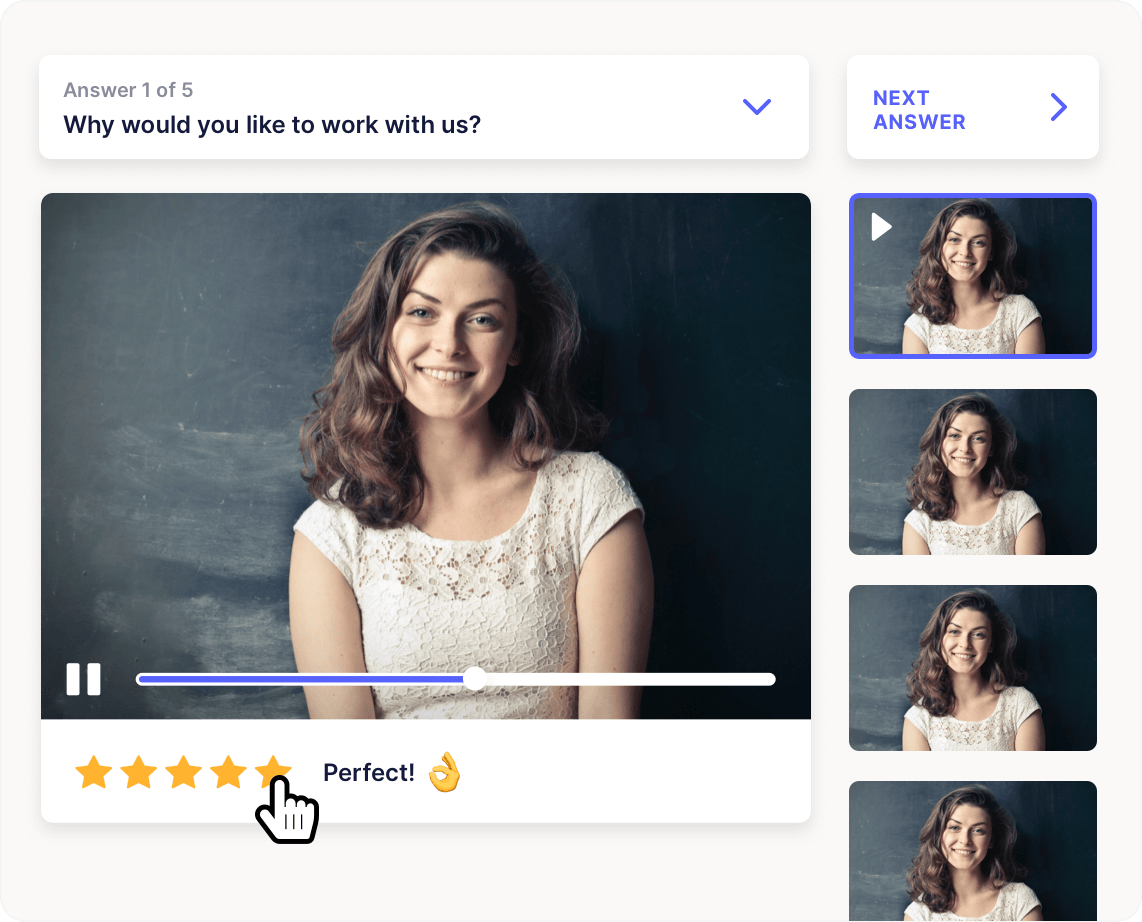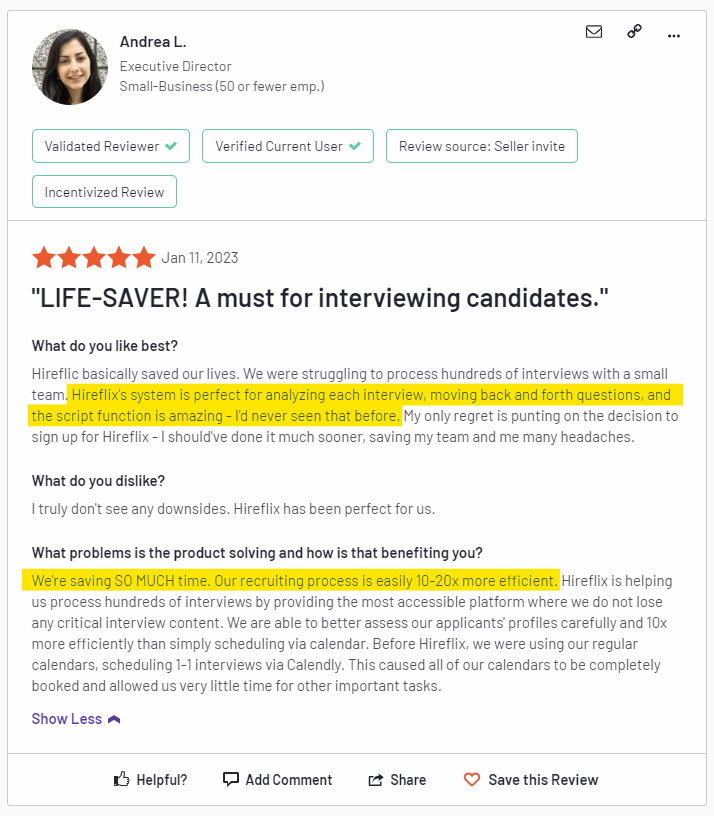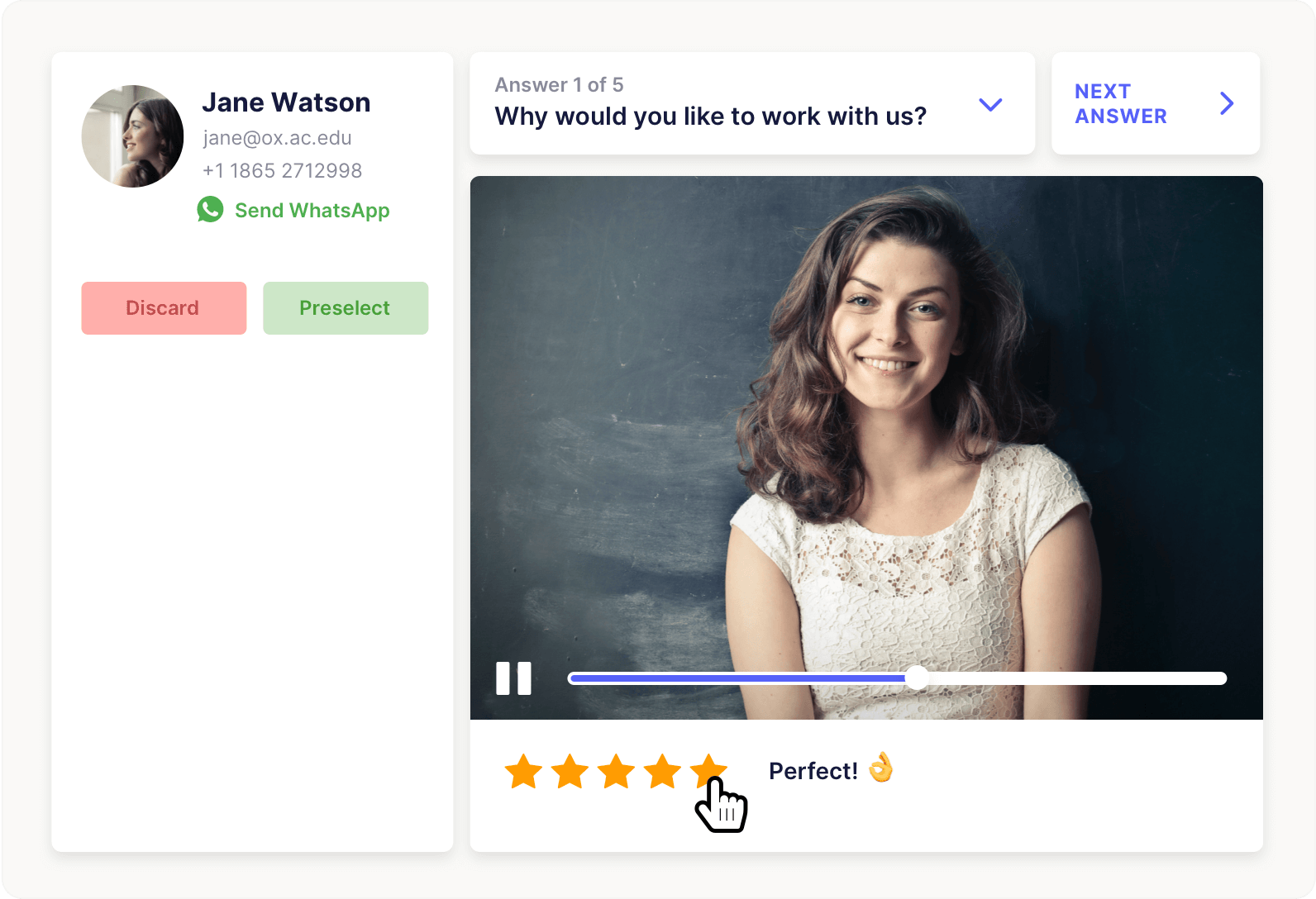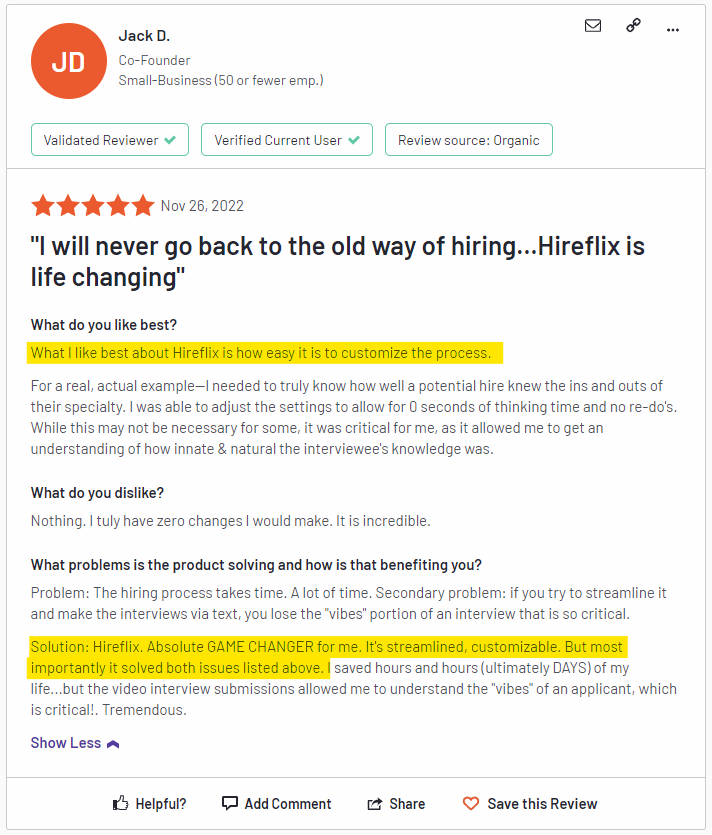13 Common Screening Interview Questions to Ask to Find Top Talent

Hiring efficiency matters now more than ever. With the early months of 2024 demonstrating widespread job growth—particularly in the areas of hospitality, business and professional services, and healthcare—you’re going to need to sharpen every tool in your toolkit in order to keep ahead of the curve.
Taking a second look at your screening interview questions could be your next best step in adjusting your hiring process.
Because the right screening questions can help you move the best candidates into the interview process, leading to consistently better hires.
Not only will you get a list of 13 quality questions to implement into your candidate screening process out of this blog, but you'll also get a peek into the power of Hireflix and discover how you can ask these questions and screen over 10, 100, or 1,000+ candidates at once.
Check out the video below to learn more:
Let's dive in.
Why Screening Interviews Are More Important Than Ever Before
Current job market trends point toward continued growth for the rest of the year. As this trend continues, you and your hiring team will need to tighten your approach so that you can draw in job seekers and move them down your pipeline quickly.
This responsibility is not to be taken lightly.
Whether delivered through an in-person or a remote interview process, screening interview questions are a great way to eliminate candidates who are unqualified, underqualified, or unsuitable, leaving you to focus your time, energy, and resources only on those who are the best fit.
But in setting up your screening interview process, there are some potential pitfalls.
The Dangers of Asking Bad Screening Interview Questions
When done well, a screening process or pre-screening interview will help weed out unfit candidates so that you can focus on the cream of the crop. When done poorly, however, screening interview questions can sometimes cause more harm than good.
For example, certain job interview questions can insert the potential for bias into your screening process.
Even something as simple as “Tell me about your accomplishments” can create a bias, particularly for candidates who come from cultures in which listing one’s personal accomplishments is seen as bragging or boasting. This question inserts a natural advantage for some while proving disadvantageous for others.
That is why, when creating screening interview questions, you must always carefully filter each potential question for hidden bias. If you miss this step in the process, you could create hidden barriers for some of your most qualified candidates before they even have a chance to advance in your interview process.
When choosing your screening questions, another concern relates to compliance with legal and ethical guidelines. In efforts to protect privacy and ensure fairness, certain types of questions have been deemed off-limits.
Illegal pre screening interview questions include queries related to:
- Sex, sexual orientation, and gender identity
- Marital or family status
- Race and ethnicity
- Disability
- Religion
Always ensure that pre-screening interview questions are relevant and provide insight into a potential candidate's unique skills, experience, and fitness for the position and company culture while eliminating bias and complying with current legal and ethical guidelines.
If you’re feeling overwhelmed and aren’t sure where to start, that’s okay. We’ve gathered a list of options for you to consider, and will walk you through them below.
Perhaps even better still, here at Hireflix, we also have the tools and resources you need to make implementing a screening interview process quick and easy.

13 Screening Interview Questions to Ask
When choosing which questions to include in your pre-interview screening process, you have a wide variety of options from which to choose. These options must not only be filtered for legal guidelines and potential bias, as noted above, but they must also cover a variety of aspects, from skills to experience to personality.
You want to know both what a candidate can do and whether they will function well within a given work environment.
A well-structured battery of pre screening interview questions can help you judge a candidate’s levels of:
- Knowledge and experience
- Teamwork/cooperation
- Adaptability/creativity
- Critical/analytical thinking
- Relational strengths and weaknesses
- Communication skills
- Time management
- Attention to detail
- Decision making
- Integrity
While the questions you could ask seem limitless, there’s actually a rhyme and reason to the process.
To get started on the right foot, we recommend considering the following thirteen common interview questions.
Question 1: What initially attracted you to our company and this position?
This question is deceptively simple. Depending on how the candidate answers, you may receive a wealth of information.
- What the job seeker knows about your company
- Whether they understand the open position and what it entails
- Whether the candidate has the skills, experience, or enthusiasm needed to get the job done
Question 2: How would you describe your work style and approach to completing tasks?
This question helps you get a handle on the candidate’s soft skills and how well they will be able to fit into the work environment.
- What is their level of self-awareness?
- What instincts and personality traits can you observe in their answers?
- Do they understand and can they articulate the conditions under which they could thrive at work?
- Are the conditions they described a good match for the role they would be assuming if they got the job?
Question 3: Can you provide an example of a time when you had to overcome a significant challenge at work? How did you handle it?
Behavioral questions such as these do more than simply give you insight into how people approach handling challenges at work. They also offer an idea of what type of situation a candidate would classify as a “significant challenge” in the first place.
While listening to the answer, analyze both the approach they took and the steps they followed to resolve the challenge.
Also, listen to the way in which they talk about the other parties involved in the situation. Even if the other party was clearly in the wrong, speaking in a belittling or disparaging way is a major red flag.
Question 4: What is your experience with [specific skill or software relevant to the position]?
With this question, listen not just to what the candidate says but to how they say it.
Disorganized or overly long-winded answers may be a sign of someone overcompensating for a lack of skill or experience.
A job seeker who truly has experience with specific skills and software can generally speak to them competently, confidently, and concisely—even off the cuff. Someone who can do so is someone you’ll want to focus energy and attention on moving forward in the interview process.
Question 5: Can you tell me about a project you worked on that you are particularly proud of? What was your role, and what was the outcome?
This screening interview question can help you target people who have already achieved professional accomplishments within their field.
Those who cannot name a completed project in which they played a role—or those who pivot to personal accomplishments in lieu of professional ones—are not the candidates you will likely spend time to move on to the next step.
Question 6: How do you prioritize competing tasks and responsibilities in your work?
Answers to this screening question will help you understand:
- How a job seeker understands and prioritizes tasks
- How they determine levels of urgency
- How they plan to manage their workload
The answers to this question will go far toward helping you determine which job seekers are the best candidates to move forward toward a formal interview and which are not.
Question 7: Describe a time when you had to work with a difficult colleague or team member. How did you handle the situation?
Does this candidate know how to take positive, proactive steps to resolve friction and strife within a team—particularly where difficult colleagues or team members are involved?
Mature, professional job seekers can articulate how they have solved conflicts in the past, giving you an idea of how they will handle similar situations in the future.
These are the job seekers you will want to speed down your pipeline.
Question 8: Can you explain how you stay organized and keep track of important deadlines?
No matter what position you’re filling, organizational skills will play a key component in the candidate’s success.
In answers to this screening question, what is important to listen for is not so much that job seekers follow some mythical “best way” to organize and track deadlines. What’s important is that they have found a system that works best for them and can demonstrate a successful track record in carrying it out.
Question 9: How do you handle and resolve conflicts with clients or customers?
Ideally, the candidate will name a particular instance from their past job experience and describe the actions they took to resolve the situation. This example will give you a good idea of whether their customer service skills are a match for the position at hand.
If they cannot do so, it’s likely because they lack the skills or experience necessary for the role. You can feel comfortable not moving them forward in the hiring process and targeting your attention elsewhere.
Question 10: What are your long-term career goals, and how do you see this position fitting into those goals?
How a candidate answers this question can tell you more than just where they would like to see themselves in five or ten years. Their answer can also reveal whether the open position—or the company offering the job—will hold them long-term or if they’re likely to use the position to leapfrog to something else.
These are important considerations in the hiring process, and analyzing answers can help you sort candidates accordingly.
Question 11: Can you tell me about a time when you took a risk or tried something new at work? What was the outcome?
What you’re listening for here is not so much whether the candidate takes risks but what their approach to taking risks is—and what sort of move they consider a “risk.”
This will help you gauge who’s more likely to be a good fit for the open position and move them toward the next steps in the hiring process.
Question 12: If you were given an unlimited budget and resources, what project or initiative would you pursue in this position?
Does the job seeker have a vision for the future—dreams and aspirations that go beyond the open position and could uplift not only the company but also the entire industry? Do they have initiative and express innovative ideas?
Their answer to this question will hint at that, giving you more information with which you can sort your potential candidates.
Question 13: Describe a time when you had to adapt to a significant change in your work environment or processes. How did you handle the change, and what was the outcome?
This behavioral screening interview question will help you evaluate how the job seeker copes with change.
What you’re looking for here are signs of:
- Cooperation
- Flexibility
- Adaptability
While change can be hard for everyone, it’s harder for some people than for others, and those who have difficulty adapting when the situation calls for it may not be the best choice to move forward in the hiring process.
The Best Way to Conduct a Pre-screening Interview
Yes, a pre-screening interview can lighten your workload and streamline your hiring process.
However, not all approaches are equally efficient.
When it comes to conducting pre-screening interviews, have a variety of options:
- In-person interviews
- Phone interviews
- Video interviews (including both synchronous and asynchronous)
While the first option is clearly the most time-consuming, the second two often prove a better fit for helping you accelerate your pace.
And because time is a major factor in hiring, it’s worth asking what further steps you can take to speed up the process.
The answer is by using one-way video software.

Here at Hireflix, our one-way video interview software is an efficient and effective way to conduct pre-screening interviews. This allows both you and your job seekers to make the best use of your time.
Thanks to Hireflix, you can set up your pre-screening in just a few simple steps.
- Record your pre-screening questions
- Accept candidate responses
- Review and share submissions among your hiring team
- Eliminate or advance candidates accordingly
By using Hireflix’s one-way video interview software for pre screening interviews, you can save yourself time and energy while still accelerating your hiring process. This reduces the chance that the most qualified candidate will be hired elsewhere before you get a chance to interview them.

Hireflix is Here to Help
There’s no doubt that establishing a system for screening interview questions can improve your hiring process. But the thought of getting started might seem daunting.
If you are a hiring manager, recruiter, human resource professional, or anyone else involved in hiring, you may be wondering the best way to implement an effective and efficient screening process.
The good news is that Hireflix can help. Our powerful automation tools can help you build a simple and sustainable system that does the hard work on your behalf. Request a demo today!

